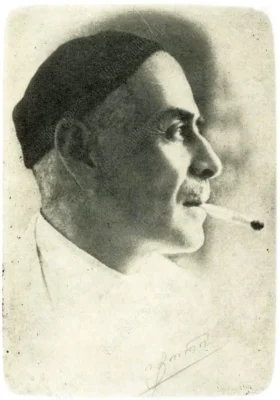Konstantine Marjanishvili (1872 Kvareli – 1933 Moscow) – Composer and stage director. Born in Kvareli, in the family of Alexander Marjanishvili (Marjanov) and Princess Elizaveta Chavchavadze, Hegumen Tamar’s brother. He began his career as a theater actor in Kutaisi and Tbilisi from 1893–1896 before traveling with Russian theaters throughout the Russian Empire in the late 1890s. In 1904–1905, he worked as stage director for the Nezlobin Theater in Riga but was also involved in revolutionary activities and befriended the famous Russian writer Maxim Gorkii. He organized and led Kharkov the Actors Association to protect actor’s rights in 1906.
In 1907–1908, he acted with Duvan-Tortsov’s troupe in Kiev and, in 1908–1909, with Bagrov’s company in Odessa. However, he was soon expelled from the theater because of the on-stage performance of the Marseillaise.
In 1909, he returned to Nezlobin Theater and later founded the Georgian Drama Studio. From 1910–1913, he performed at the Moscow Arts Theater but then founded the Free Theater in Moscow in 1913. After the closure of the Free Theater, he moved to Rostov-on-Don, where he directed the local theater in 1914–1915. Marjanishvili was invited to Petrograd where he took charge of the Bouffe Theater in 1916–1917.
After the Bolshevik Revolution, he became one of the founders of the Soviet theater and later directed the Free Comedy Theater and Comic Opera Theater. In 1919, he served as a commissar of theaters in Kiev. In 1922, he returned to Georgia, where he directed the Rustaveli Theater. In 1928, he established the Drama Theater in Kutaisi, which later moved to Tbilisi and now carries his name. In his later years, Marjanishvili worked at Korsh Theater (1931–1932), Malyi Theater and Operetta Theater in Moscow (1933).
He was awarded the title of People’s Artist of the Georgian SSR in 1931. He was famous for his lavish and massive theater shows, and among his stage productions are The End of the “Nadezhda” (1909), Dostoevsky’s Brothers Karamazov (1910), Ibsen’s Per Gynt (1912), Offenbach’s Die Schöne Helena (1913), Mozart’s Entführung aus dem Serail (1923), Eristavi’s Partition (1823), Arakishvili’s The Tale of Shota Rustaveli (1923), Shakespeare’s Hamlet (1925), Kutateli’s Midnight Past (1929), and Rossini’s William Tell (1931).
